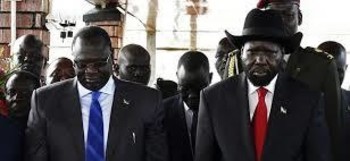Parties warned of reluctance to implement 'security arrangements'

A South Sudanese political analyst has warned of dire consequences if security arrangements are not implemented fully by the parties to the peace deal.
This came after the parties met in Ethiopia to find solutions to pending issues in the peace agreement. The meeting resolved that at least 50% of the 83,000 necessary unified forces should be trained and deployed before the end of September.
President Salva Kiir, opposition leader Riek Machar and a handful of other opposition groups signed the peace deal in September 2018. The parties had been unable to create a unified army and determine the number of states since the deal had been signed.
Brian Adeba, the deputy director of policy at the Enough Project, told Radio Tamazuj that this agreement will not be different from the 2015 peace deal that collapsed if the parties to the peace agreement are reluctant to carry out security sector reforms.
The observer pointed out that crucial security arrangements are still not in place despite a fast-approaching deadline to form a transitional government in November. He argued that the slow implementation of the peace agreement was due to lack of trust between the parties.
Adeba urged the government and opposition groups not to repeat past mistakes. “The failure of the government to prioritize the implementation of the peace agreement will return us to square one,” he stressed.
The revitalized peace deal will not succeed without proper security arrangements in place, according to the analyst.
Corruption in South Sudan
Separately, Adeba said international institutions have failed to control corruption among South Sudanese leaders, prompting the lack of seriousness to oversee a peaceful transition in the world’s youngest nation. The analyst further said failure to control corruption in South Sudan has also delayed the implementation of the peace deal.
He appealed to the UN Security Council to make tough choices against South Sudanese leaders for their roles in perpetuating the violence.
In October 2018, the US non-profit group Sentry released a report in which it said a number of banks operating in South Sudan have been hijacked for the personal benefit of leaders and powerful officials in the country.
More than half of the 26 banks operating in South Sudan, a total of 14 banks, are partially owned or controlled by powerful South Sudanese elites, suggesting an undue level of political influence in the banking sector, according to the report.
The Sentry recommended that correspondent banks and regulators should agree to remove the most politically influenced local banks from the global financial system to prevent large-scale de-risking and restore international confidence in the banking sector.